Being frugal on the homestead is a way of life for most homesteaders. Learning vintage skills and frugal ways of doing things is often a way of survival. Many folks learn these skills from their grandparents, generations that were homesteaders from the start.
There is a lot that grandparents can teach a new homesteader. Here are some tips and tricks on being frugal that I’ve learned from my grandparents who had a homestead.
From the time I was a young child my grandmother used to quote to me, “Use it up, wear it out, make it do or do without”.
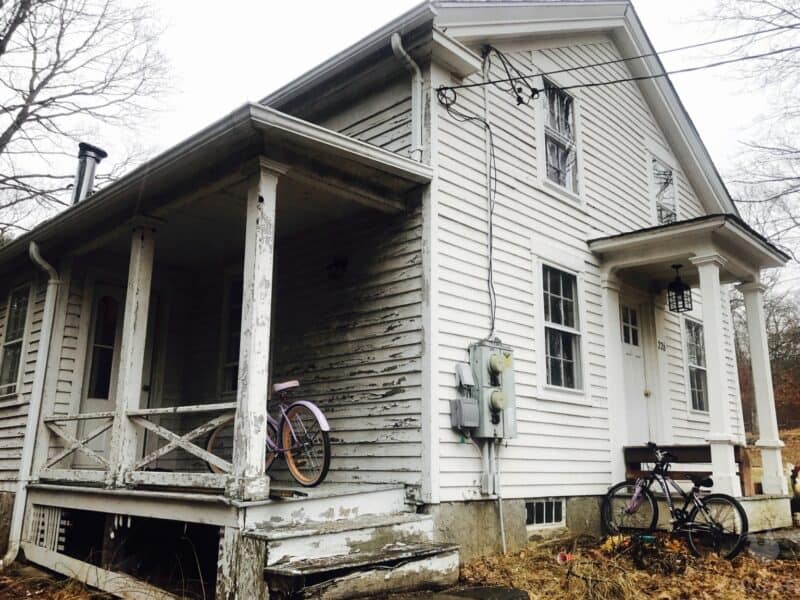
For some reason that particular quote stayed with me and today, when I work on my own frugal homestead I often find myself thinking that as I ponder what to do with something and I’m considering tossing it out.
If I can’t find an immediate way to repurpose something, I’ll often set it aside for a few weeks and ponder the value and usefulness of the item until I have an epiphany at which point, I will repurpose it.
This isn’t just frugal, it’s a great way to keep from having to throw something out that may still have other uses. It’s also a great way to save money by not having to buy something brand new when I have my epiphany of what to do with said item.
Before we start, it’s important to understand that there is a huge difference in being frugal, and cheap. Frugality is all about using what you have on hand and re-purposing it until it has no more purpose left in it.
Learning to stretch your money to make the most of what you have and in an effort to save as much money as you can possibly save. Learn to consider quality over quantity. Quality can be frugal while cheap can be expensive in the long run because you’re going to have to be constantly replacing things that were cheap to begin with.
Table of Contents:
Kitchen Frugality
There are plenty of ways you can save money in the kitchen. Here are a few pointers.
Make Soup
I had a friend years ago that saved all of her vegetable scraps in a bag in her freezer. About once a month (usually the day before payday as she was flat broke) she’d take this bag out of her freezer and put it all in a soup pot.
She’d then fill the soup pot with water and simmer the scraps in her soup pot for several hours. After a few hours she’d strain out the vegetable scraps (usually these were peelings, pits, end pieces that she had cut off of her vegetables as she prepared them for a meal).
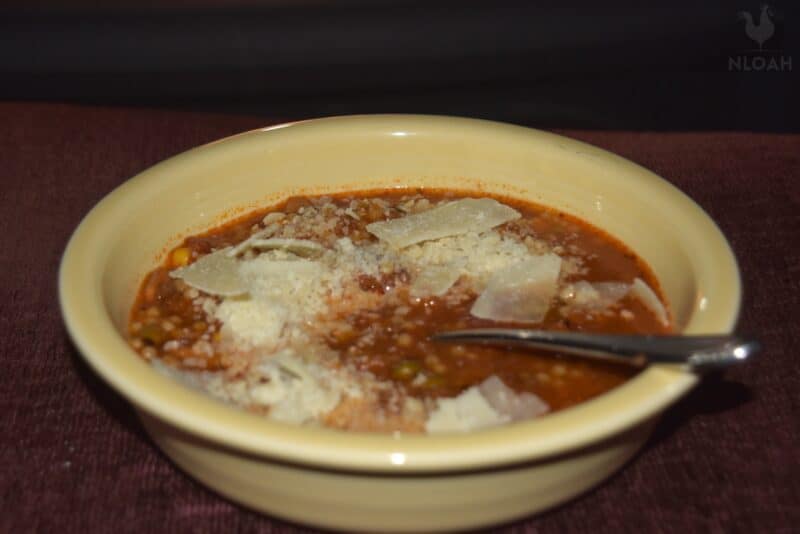
She’d then go through her refrigerator and grab out bits of leftover foods such as that tablespoon of rice or potatoes that were left over from a dinner, a few bites of this or that and so on.
She’d put these into the broth and simmer them the rest of the day seasoning the soup here and there as required. She’d make biscuits or dumplings for the top and serve this for dinner that night. We called it soup, her daughter called it garbage soup. Whatever it was, it made a delicious meal that was using up scraps and leftovers.
Bone broth is another thing to make in your kitchen. Those bones you remove from meat as you’re eating can all be saved and boiled into a delicious and nutritious bone broth.
Simply save all the beef in one bag, chicken in another, pork in another and so on. When you have a kettle full or enough for a large crockpot, put them all in and add water. Let this simmer all day long.
Some people put a tablespoon of vinegar into the bone broth to help leech the marrow out of the bones. It makes them softer and if you don’t use too much you won’t notice the vinegar taste in your bone broth.
I was at the doctor recently and my doctor asked me if I drink bone broth. I told her no and she told me that I should be drinking it. According to my doctor, if I drink bone broth I’d feel healthier, more energetic, and my joints won’t ache as much. I have to admit, after I tried it, she was right.
Cook from Scratch
Cooking from scratch is another way to be frugal in the kitchen. It’s healthier to know what is in your foods and many prepackaged foods contain chemicals and other preservatives that can affect your health.
It’s quick and easy to make your own mixes such as pancake mix, biscuit mix and so on and store them in a jar. It’s also a great way to save money.
Use a Crockpot
I’m a big fan of slow cookers. Not only do they allow you to make large amounts of food more quickly (and hands-off!) but they also make it easy for you to save money. No fancy ingredients needed – even the worst cut of meat becomes quite tasty when cooked all day in a crock pot.
Buy in Bulk
Whenever possible, we buy in bulk at our homestead. This saves us a lot of money and we have plastic and rubberized bins that we put such things in as flour and rice. When we find something on sale that we use frequently we also stock up on it at that time.
You might want to check warehouse or wholesale stores or even Amazon for good discounts on these sorts of staples – they often last for years on end without going bad.
Cut Out Unnecessary Items
I’d like to say we’ve quit using paper towels, but we still keep them on hand for some things. However, I have a strategy that has helped me to reduce our paper towel usage.
We have old ripped up towels that are now used to sop up spills (including puppy accidents) and we have newspaper that we often use to sop up liquid that spills and strain grease. Newsprint is also ideal for draining fried foods on.
Preserve Your Own Food
We also dehydrate and can a lot of our produce from our garden and the fruits from our fruit trees. This helps me to stock up our pantry and in the winter months it’s fun to go and grab a jar of peaches out of the pantry and whip up some peach cobbler.
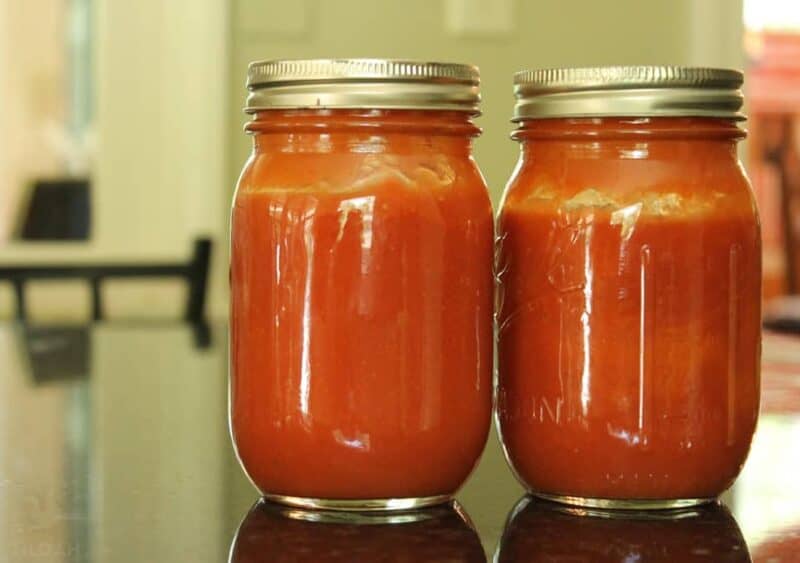
Learning to can our own food has saved us a lot of money and everyone can help from picking the food to preparing it for the canning process. It’s a fun family event that everyone can participate in on our homestead.
Catch the Food That’s Going Bad
Have some bananas that are starting to turn brown? Don’t throw them out – use them for banana bread! Whenever you see some food that’s starting to go bad, as long as it’s safe, consider using it for a unique recipe
Similarly, if you realize, when you buy a food, that it isn’t going to last that long, consider freezing it to allow it to last longer.
Make Your Own Cleaning Products
Most of my cleaning products are made at home. I rarely, if ever, purchase a cleaning product. Instead, I use vinegar, baking soda, lemons and avoid unnecessary chemicals and focus on all natural cleaning methods.
It’s amazing how easy it is to clean with these products and my house smells wonderful and fresh. I’ve saved a lot of money on cleaning products and used the money I’ve saved to build our savings account.
Plan Your Meals
Planning out your meals ahead of time is a great way to not only save money, but also to stay healthy. If you know exactly what foods you need to prepare for each meal and have those ingredients ready ahead of time, you’ll be less likely to reach for less healthy and more expensive alternatives.
Eat Seasonally
Eating seasonally is a trend that is not only great for you and your bottom line, but also for the environment. As much as you can reduce the impact that you are having on the local and global environment, the better.
When you eat seasonally, you are eating foods that are in season for the time of year – think squashes in the fall, berries in the spring, and tomatoes during the summer.
When you eat food that doesn’t have to be shipped hundreds of thousands of miles to get to you, you will save money and even improve your health – seasonal produce is often much higher in nutrients.
Invest in a Freezer
Freezing is a great way to preserve a lot of food quickly – even if you don’t have the equipment or skills necessary to can or dehydrate your food. Buying a deep freezer can save you a ton of money, especially when it comes to meat.
If you butcher or process your own animals or vegetables, perfect! You will have plenty of space to store them in a freezer. If you don’t, you might want to consider buying your meat in bulk, which is often much cheaper than buying it by the pound at the grocery store.
Make the Most of Scraps
If you can’t make a meal out of the last bit of dinner, think about what else you can do with it. Some foods, like ginger, celery, romaine lettuce, green onions, potatoes, sweet potatoes, and garlic, will grow into whole new plants if given the right conditions. Often, all you need is a heart or a small piece of the plant.
If that’s not practical, consider what else you can do with it. Feed the scrap to your chickens? Maybe your pigs? Less waste equals less expense and more frugality.
Remember the Power of Negotiation
Whenever possible, haggle over your monthly bills or even your one-time purchases. You might think the rates charged by your electric company are set in stone – but that’s not the case. Often, you can negotiate a lower rate for different services just by making one simple phone call.
Unplug
When you are headed out of the house, unplug your appliances. You don’t have to go around and turn them all off one by one – you can easily just flip a breaker panel switch. You aren’t going to be home, so why waste the electricity?
Start Recycling
Finished up a jar of mayonnaise or a can of spaghetti sauce? Don’t throw them out! Not only will you be adding more waste to the landfill, but you’re also missing an opportunity.
My husband loves using old food storage containers to stash his odd nails and screws in. There are plenty of ways you can reuse old jars and containers – just be creative, and get a stockpile going!
In The Garden
Compost
Frugality in the garden for us started with our compost pile. Everything that can be composted from the kitchen and the rest of the homestead is put in this pile as well as grass clippings, leaves, and plants at the end of the season.
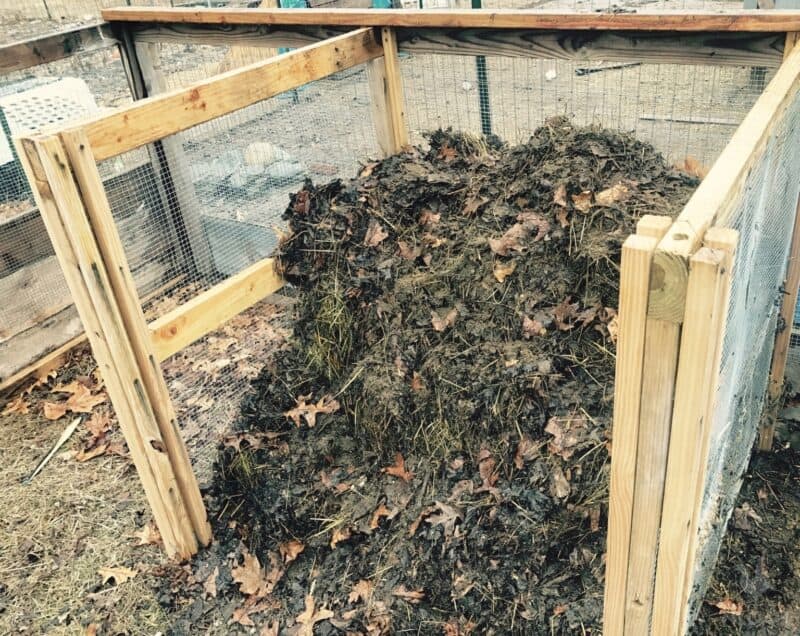
What results is a nutrient rich compost that we incorporate back into the garden. The result is free compost and a lot of great blooms on the plants. This also makes our garden organic as we don’t use any commercial fertilizer on our plants. It’s a great way to raise a healthier garden.
Plant Wisely
I’ve learned, over the years, how companion planting works. By companion planting my garden is thriving. I plant climbing plants around taller plants like corn and allow the climbing plants to climb up and around the corn. I don’t plant enough to choke my corn out, but it really helps to be frugal and save space in my garden.
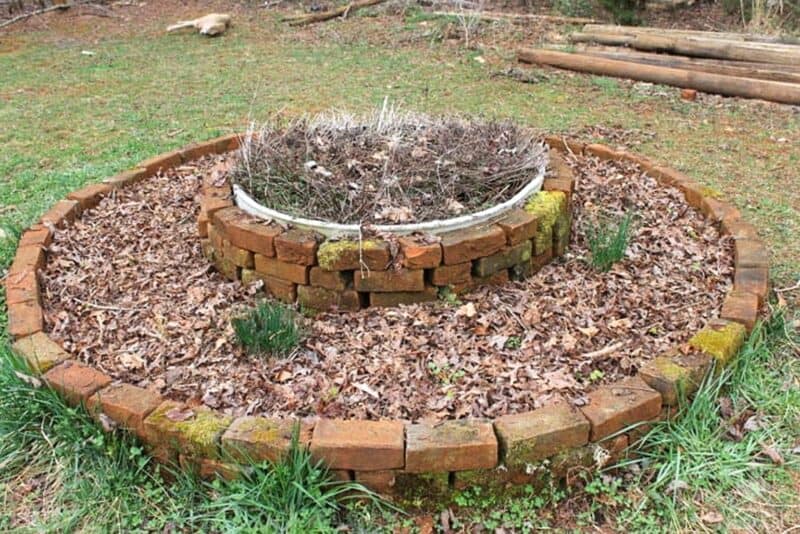
Plant Extra
If you’re going to be canning and dehydrating you can plant a little bit extra so that you’ll have plenty. Thanks to being frugal and saving our seeds and using our own compost, this is easier than ever.
You can also sell your excess produce at a produce stand, farmers market or to neighbors and friends. It’s a great way to be frugal and will help you to stay within your budget.
Save Seeds
Every year we save some of our seeds from our seed bearing plants. These include such plants as peas, beans, squash, and yes, even tomatoes. I allow them to sit on a plate and dry turning them occasionally to make sure they aren’t molding underneath.
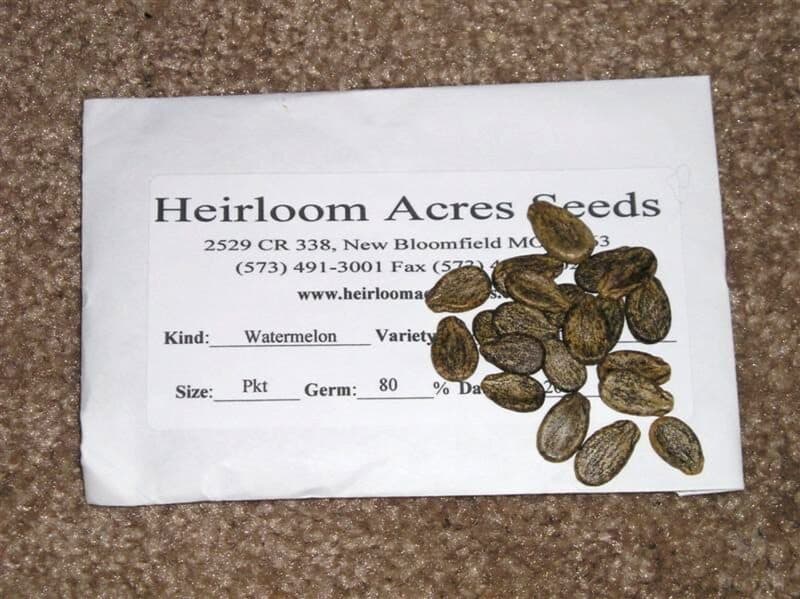
The result is free plants for the next gardening season. I store them in an envelope and label each envelope and when it’s time to plant the following season, I have free seeds.
I’ve been doing this for years now and I’m not really sure when I last bought commercial seeds. Just make sure that the first set of seeds that you purchase are heirloom quality.
Save Rainwater
I know that many areas have regulations on saving rainwater, there aren’t any laws on this in my region so we have rain barrels that we have put at the bottom of our drain spouts on the barn and on the house. I then fill my watering can with this for watering the flower beds.
We have a hose attached to the bottom of our rain barrels and have them strategically placed near the garden so that we can also use this water for watering our garden whenever possible.
Yes, we still have to turn the water on now and again, but the rain barrels do help us to reduce our water consumption and be more frugal.
In the Home
There are plenty of hacks you can implement to increase your savings in the home, too. Here are some ideas.
Insulate Your Walls
You probably already have insulation, but if you live in an older home, it’s a good idea to go around and make sure your insulation is holding up. Add more where needed – you’d be surprised by how many older homes lack insulation at all.
You can also take the opportunity each fall to winterize your home. Check that your weather stripping is intact and secure around doors and windows, and add more weather stripping or caulk as need.
You can even stuff some towels around your doors to prevent drafts. You’ll be amazed at how much less it costs to heat your home!
Cut Out the Luxuries
Do you have cable? Get rid of it. How about an expensive cell phone plan? Maybe you have a laptop collecting dust in the corner that you only use to pay bills. Get rid f the expensive frills you don’t need and don’t use.
Even if you rely on a laptop to work from home, you can even invest in a Bluetooth keyboard so that you can do everything from your smartphone.
Switch to Wood Heat
This might not be possible for everyone, but if you can, consider upgrading your home heating system to wood. This will allow you to save money if you own your own property because you can simply go out and cut your own firewood rather than relying on fuel oil. It’s also a great workout!
If you can’t afford to make the switch to wood heat – or if you live in a location that does not allow it – you might want to try turning your thermostat down.
In the winter, drop the thermostat to 65 degrees. In the summer, bump it up to 72. You’ll not only save money, but likely find that your health improves by not constantly requiring your body to fluctuate between temperature extremes, too.
Embrace the Clothesline
Don’t waste money with a dryer! Instead, invest in a clothesline. Let the wind dry your clothes – it is also much better for the environment.
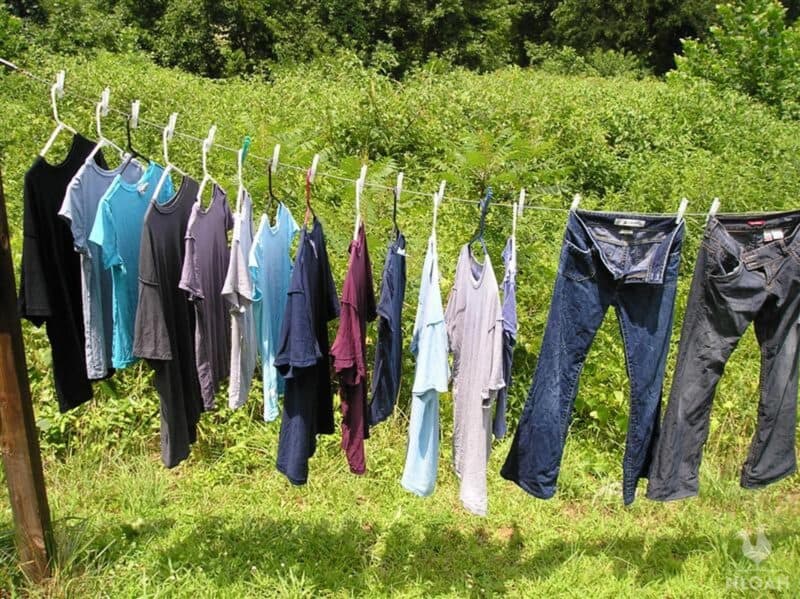
Use Less – and Always Buy Used
You often use way more of a product than you actually need to. Instead of putting a huge glob of toothpaste on your toothbrush or a giant dollop of shampoo in your hair, try using about half as much. You will be amazed at how much money you save by not overdoing it with everyday products.
When you do have to buy more items for your home, particularly when it’s something you can’t make for yourself, shop mindfully.
Consider whether the item you want to buy can be found on a discount site like Craigslist or at a thrift store. If you must go to the store for a new item, try to wait as long as possible to make sure you actually need the item.
Do Your Own Mending
Learn how to sew. Even a few basic stitches can save you a ton of money on new clothes and visits to the tailor. You can even find new ways to repurpose old items, like used bedsheets, into new pieces that can be enjoyed.
In The Barn, Shop, and Garage
Stay On Top of Repairs
We keep tools in all of these locations so I’ve combined this category to make it easier. Keep your tools in good repair. I store all of my gardening implements such as shovels, trowels, and so on in a bucket that has a bit of oil in the bottom of it. This keeps them lubricated and helps to prevent rust.
We also buy tools and garden implements that we may need at 2nd hand stores, yard sales, and other used venues that we find along the way. Some of the tools are hand me downs from my dad and my grandfather. As long as the working portion of the item is still useful, we can always add a handle.
Repurpose Scrap Wood
Speaking of handles, my husband had a habit in our younger years of getting up very early and driving through the small town nearby. He would grab the few items we may need at the grocery store first thing and then go behind businesses where he’d previously received permission to pick up scrap wood and other useful items.
These pieces of scrap wood and pallets made great replacement handles for many of our tools and even the ax.
My husband did this for years. Today, we have a nice stack of wood scraps and pallets that we use for various projects in and around our homestead.
Pallets are my personal favorite – they are so easy to find for free, and they can be used for building everything from furniture to compost bins. Keep some on hand!
The bits leftover from our wood projects then go into our wood supply for the upcoming winter months.
This frugal habit has helped us to build a virtually free shed, wood shed, and patio awning. Next on the list is a dog house and another deck in another area of our yard. All with scraps that we’ve picked up over the years.
My husband also managed to pick up a roll of slightly used carpet that carpeted our house. Not a thing was wrong with this carpet. There were no stains, no rips or tears.
The owner of the carpet shop said that a customer had his home carpeted and gave him the old carpet. We really appreciate the carpet under our feet in the morning and there is absolutely nothing wrong with this carpet. It even matches the colors in our living room.
My husband also had a habit of swinging by nearby construction sites and getting to know the construction workers. After getting to know several of them, he offered to haul off their leftover scraps, yep, right to our barn.
I think we have a few stalls that have not only wood scraps stored in them, but also insulation (rather than take a partial roll back one company always threw it out so we have plenty of insulation) and other items that eventually will be very useful on our homestead.
DIY Your Feed
Grow your own feed for your animals. Many homesteads have plenty of space to grow alfalfa and other feed for their own animals.
They sell part of what they grow and store the rest of it in the barn for winter months. If you don’t have the proper farm equipment get together with a few other homesteaders and work out a bartering deal.
Clean it Up
It’s amazing how many animal illnesses can be prevented by simply practicing good animal husbandry. Cleaning plays a big role here.
Make sure your barns are spic and span at all time, and you’ll save money because you’ll be preventing illnesses that frequently require medication. The same rule applies for inside your house, too.
Breed Animals on the Farm
If you can, breed your own livestock – don’t buy new animals each year. If you raise chickens, this is the easiest place to start. You can hatch your own chicken eggs with as little as an inexpensive incubator and some patience.
Sprout Fodder
Making your own animal feed is one thing, but you’ll take your frugality to the next level when you learn how to sprout your own fodder.
You can save a ton of money on grain when you grow with sprouted seed, and it’s easy to do. If you’re feeling extra ambitious, you can also ferment your feed to increase the bioavailability of nutrients for your animals.
You can save some money by getting rid of something you don’t want for something you truly need – plus, tax doesn’t need to get involved.
Consider What Your Labor is Worth
Sometimes, you might be able to fix or DIY something – but it would cost you just a few dollars to buy it from the store whereas the homemade version would be more expensive.
Or it might take you just as long to fix it or build it! If that’s the case, you need to start evaluating what your labor is worth. Being frugal is great, but you also need to be practical.
Another idea is to automate as many items as possible around the homestead so that you can save time and be able to use it somewhere else (such as making more money!).
For example, you might want to consider setting up auto-feeders and auto-waterers for your animals. You don’t have to buy these at the store – they’re often quite easy to DIY. However, this will save unnecessary time spent feeding and watering animals every day so that you can be free to do something more lucrative with your time and energy.
Switch to LED
LED is a great way to save money on your electric bill. Not only do LED bulbs last longer, but they’re energy-efficient, too.
Recycle Plastic Bags
Did you know you can wash Ziploc bags? This will allow you to reuse them for snacks. You can also reuse plastic grocery bags as liners for indoor trash cans.
Cut Your Own Hair
Invest in a pair of good hair clippers and scissors, and you’ll never need a salon or a barber another day.
Gift Giving
Being frugal doesn’t mean not giving gifts, however, in on our homestead everyone has some great hobbies that allow them to hand-make the most wonderful gifts. From wood crafts to sewing crafts we’ve always got an idea going for the holiday season.
Repurpose Old Items
We also watch for things that can be made over into something new, updated, or might be brand new even though they are at a thrift store or yard sale and buy those for gifts.
One of my daughters likes to make wind chimes and she’s actually very good at it. One year she made a great set of wind chimes out of fishing line, old silverware, a few small sized pan lids, some can lids from food cans (she filed the edges so there aren’t any sharp edges) and was actually getting orders for them when she finished.
Another daughter loves to crochet and she has taken anything from plastic grocery store bags and bread wrappers and crocheted them into bags or mats. She also uses old worn out sheets to make rugs and other items.
She has amazing talent and will peruse a list of ideas that she has or the Internet to find something to make. She often gets orders for these as well.
All it takes is some creativity and using what you have on hand and you can have some great unique gifts that everyone loves. You’ll love saving the money and you’ll have gifts that are far more personal as people will know that you made these gifts specifically for them.
Get Social and Hands-On in Your Gifting
Gifts don’t have to be items wrapped in fancy paper and bows. Often, all your loved ones want for a gift is to spend more time with you! Give a gift of entertainment, like inviting your friends over for a game night and potluck instead of going out to dinner.
You can also give a gift of labor, like offering to clean your parents’ house or giving your husband a relaxing foot massage.
Benefits of Being Frugal
Being frugal can have a huge impact on your finances. Learning to live a frugal lifestyle works wonders to ensure that you always have an emergency fund and money on the homestead.
Being frugal helps homesteaders to be more resourceful. It helps them to utilize what they have on hand before they go out and buy something new. It’s amazing how many items on the homestead have a dual purpose.
You’ll be living greener and more environmentally friendly when you’re frugal.
My laundry smells cleaner and fresher when I hang it out to dry. It saves money on the electricity and if I do need to simply fluff something it only takes about five minutes once it’s dry to toss it into the dryer.
We opted to not have a dishwasher as they use a lot of water and electricity. Instead, I made it a special time with my kids where we share about our day and everyone helps. One person washes, one dries, one puts things away.
One of the things I love most about living frugal, is that I don’t tend to buy as much. What I do buy has meaning and purpose. I don’t collect as much clutter that way and By giving some thought and consideration to what I am going to buy, I’m able to watch for deals and stay within my budget.
I’m never bored as being frugal gives me plenty of time to make things over and upcycle things. It’s become kind of a hobby of mine. With less need for money I don’t have to work as hard at paying jobs so I have more free time to work on projects that I love.
Most of our clothes are purchased at second hand stores, this allows us to save a lot of money on our clothes and if something is ruined we don’t have to stress over the expensive clothing items that we messed up.
I limit myself to a week’s worth of clothes (since we have a washing machine I don’t have to have as many clothes as someone who has to go to a laundry mat). It also makes it easier and quicker to get dressed as I don’t have a huge closet full of clothes to choose from. It’s amazing how much easier it is, personally, I would have to say it’s liberating.
Life is less stressful when you’re frugal. You don’t have to keep up with the neighbors or anyone else. You’ll be amazed at the level of happiness you develop when you’re practicing being frugal.
Being frugal has helped us to live debt free. We’ve been able to take our extra money and pay off debt faster which not only feels good, it also raised our credit score and allowed us to stop feeling stressed over how we were going to pay our bills.
Our kids have learned new skills and vintage skills and made their own spending money by creating unique one of a kind gift items for friends and family. They can sell their extra gift items at boutiques, bazaar’s, Farmer’s Market’s, and enter them in the fair.
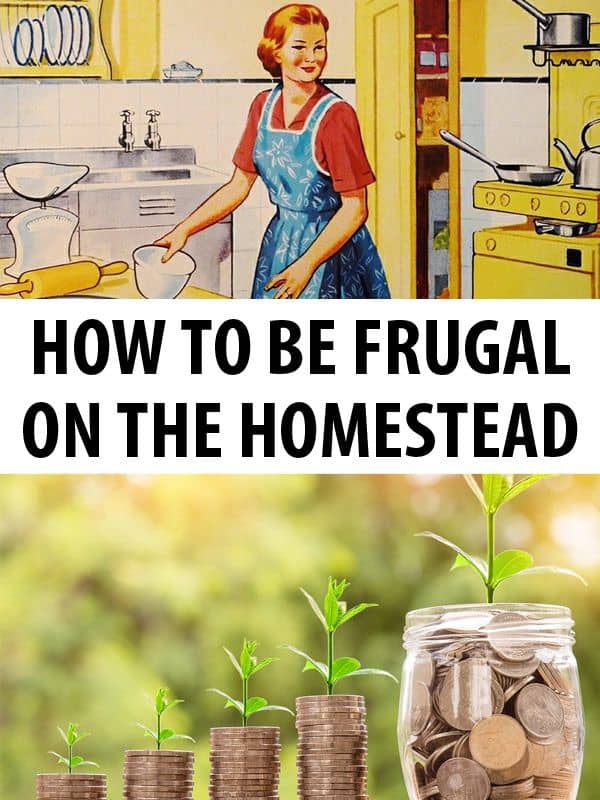

Hi, I’m Linda. I’m a mom, grandmother, homesteader. I love simple living and enjoy my life on a homestead where I garden, raise a variety of animals and strive for a life more like my grandparents lived.
My goal is to enrich life by living it as simply as possible and focusing on the way my grandparents did things. Life is so much more fun when it’s lived simply.

LED bulbs grow dimmer as they age. They don’t really last longer. I have them burn out all the time. Also, they create dirty electricity. That means that they aren’t compatible with the wiring in homes so they draw in energy and push what they don’t use back out into the wiring. Don’t believe the hype around LED bulbs.
Hello Great site.Keep going. Love to visit it regularly. I have tried to grow my own food but we now have no water for the garden. We are in drought. Very disheartened I have turned my sight onto inside savings. One thing I have learnt from sites like this one is how to use only what you need and anything left over find a way to use it, reinvent it, revamp it. Composting, Worm farms, Chooks, are not only great but you can sell the produce from if you cant use it. Because of the drought I am having to buy in bulk from where-ever I can buy from reliable organic sources. I then preserve what I dont need straight away, canning, freezing, dehydrating,and fermenting. There are other ways to be frugal. I dont buy toilet paper or cleaning supplies and no I am not dirty. I use wet cloths (which are set aside for this purpose only) to wash myself after going to the toilet. I make my own environmentally safe cleaning products. Soap making is turning into a good hobby. I have turned my hot water off and top and tail each morning. I shower once a week turning the hot water system on when it is reduced rates. I throw a small bucket of water down the toilet once a day to flush,I have turned of the tap to the toilet that refills it after every flush. Where I live you pay for water, utilities and everything the shire council can charge you for so by using as little as possible saves. A camp hot water shower run by a gas bottle is cheaper than electric or solar. There are many ingenius ways you can save not only money but water, and maintenance and replacement of equipment. Hope this helps.
This is an interesting blog. It takes me back to being a young wife/mother. First let me share that I had little to nothing as a child growing up, this included six children, five brothers and one girl. I cannot say I was starving only I truly know and understand what hunger is. The summer before my eight birthday was one of the worse, many times the only thing we had to eat were the potatoes that my sixteen year old brother brought home from the potato farm where he worked. The only time I reverted to stealing was that summer. I would steal vegetable from several neighbors’ gardens then sneak to a river, sit on the bank, and eat until I was sick. Many years later I could not “waste” food because of fear of going hungry. I placed a quart container in the freezer and added leftover foods into it: corn, green-beans, peas, meat, gravy, etc., etc., etc.. This food-gathering would be made into soups. As an adult, I have taught myself how to can and dry foods. Please know, the New Life on the Homestead blog is very special to me. Thank you.
I learned how to butcher starting with deer watching a video,i can noe cut up a dexter cow with a single knife I have also done elk I have hunted so go online get a vedio and get going.the bone broth you can make and can is delicious good for sick people
A note about using a dishwasher: most, if not all, new dishwashers actually use less water than washing dishes by hand. If you fill your sink with soapy water to wash dishes, you use more water than most dishwashers use in a regular cycle. I have so much going on here on our homestead that it’s worth the electricity cost (which for us is less than $0.10 per load, plus less than $0.10 for soap). If I wash by hand, I’ll be using more water, using my precious time, and using the same amount of soap. Just something to consider.
Hi, I don’t blame you for not wanting to do the dishes, I could never make it a family thing, my kids just wouldn’t, and neither would I when I was a child – I think it’s a gene thing!
Anyway, I am very skeptical about the claim that dishwashers use less water than I do, and if they do, I would guess that’s because they use harsher chemicals and potentially don’t rinse it off enough;
– Wipe the dishes before the food dries with waste paper or even food waste, like potato peelings.
– if badly soiled stack in sink with a tiny smidgin of water between each item for five mins.
– damp a sponge scrubber and add the tiniest drop of dish soap, rub both sides of dishes with said sponge, it should be soapy, start with least dirty dishes.
– drop dishes into a half bowl of hot water and agitate before draining. (this can be quite a small amount of water if you don’t use much soap).
– leave to air dry
– if there are slight food marks remaining on pans, leave them to dry and use a dry metal pan scrubber to remove before next use.
If you get the soap amount right this method uses very little water.
Another advantage of this method, over using very little water, is that grease is turned into a colloid before going down the plug hole, so it won’t block your sink or form fat bergs in the sewers, and you don’t need such harsh chemicals as are used in dishwashers.
My work place has a dish washer and I wouldn’t use the dishes from it without rinsing them first, they always smell of detergent and/or old re cooked food, even though it’s mostly only tea and coffee cups put in it.
Frugality is absolutely necessary on most homesteads; we are extremely frugal, and use many of these methods and more. Of course, we’re still building up. We have lots of exciting new projects coming up (like our rabbit colony that we’ll be featuring on the blog), and upcycling definitely helps us to save more! I also save plastic containers for growing some plants and seeds, saves a lot of money when the spring comes along! Great post!
Enjoyed the article, any way that we can save money is a blessing. I will look into trying some of these. Thanks!
Frugal mindset can extend assets – and it’s how most people survived food challenges in our less-than-abundance past.
Thank you.
Thank you for this article.